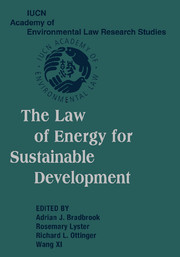Book contents
- Frontmatter
- Contents
- Acknowledgments
- Message from Kofi A. Annan, Secretary-General, United Nations
- Introduction – A Global Learned Society to Address Earth's Evolution: The IUCN Academy of Environmental Law
- Public Lectures on International Environmental Law
- PART ONE SUSTAINABLE DEVELOPMENT AND THE ROLE OF ENERGY LAW
- PART TWO LEGAL ISSUES IN CONTEMPORARY ENERGY LAW
- PART THREE INTERNATIONAL ENERGY LAW
- PART FOUR COMPARATIVE ENERGY LAW
- 18 UNDP: China's Energy Portfolio
- 19 Implementing the Kyoto Protocol beyond the WSSD at Johannesburg – The Japanese Perspective
- 20 Strategy, Policy, and Law Promoting Renewable Energy Resources in China
- 21 Energy Development and Utilization in Africa
- 22 European Energy Law Initiatives
- 23 The Law of Energy for Sustainable Development in Britain
- PART FIVE ELECTRICITY RESTRUCTURING
- PART SIX FINANCING FOR SUSTAINABLE ENERGY
- PART SEVEN CIVIL SOCIETY AND THE PROCEDURAL REQUIREMENTS OF ENERGY LAW FOR SUSTAINABLE DEVELOPMENT
- Index
20 - Strategy, Policy, and Law Promoting Renewable Energy Resources in China
Published online by Cambridge University Press: 10 August 2009
- Frontmatter
- Contents
- Acknowledgments
- Message from Kofi A. Annan, Secretary-General, United Nations
- Introduction – A Global Learned Society to Address Earth's Evolution: The IUCN Academy of Environmental Law
- Public Lectures on International Environmental Law
- PART ONE SUSTAINABLE DEVELOPMENT AND THE ROLE OF ENERGY LAW
- PART TWO LEGAL ISSUES IN CONTEMPORARY ENERGY LAW
- PART THREE INTERNATIONAL ENERGY LAW
- PART FOUR COMPARATIVE ENERGY LAW
- 18 UNDP: China's Energy Portfolio
- 19 Implementing the Kyoto Protocol beyond the WSSD at Johannesburg – The Japanese Perspective
- 20 Strategy, Policy, and Law Promoting Renewable Energy Resources in China
- 21 Energy Development and Utilization in Africa
- 22 European Energy Law Initiatives
- 23 The Law of Energy for Sustainable Development in Britain
- PART FIVE ELECTRICITY RESTRUCTURING
- PART SIX FINANCING FOR SUSTAINABLE ENERGY
- PART SEVEN CIVIL SOCIETY AND THE PROCEDURAL REQUIREMENTS OF ENERGY LAW FOR SUSTAINABLE DEVELOPMENT
- Index
Summary
INTRODUCTION
Based on an analysis of both current energy structures and strategies for developing renewable energy resources, this chapter makes a number of suggestions for an appropriate legislative and systems framework for further development of the sector.
Energy resources are essential for social and economic development, as well as for the everyday life of a human being. They are part of the physical basis for human survival and constitute a critical pillar for the development of modern industry. The whole process of human civilization has been witness to the development and usage of energy resources. Per capita measures of energy resources, energy efficiency, and the environmental impacts of energy production and usage are some of the important indicators for assessing a country's level of modernization. Nowadays, the overdevelopment and consequent overuse of energy resources is one of the primary causes of many types of environmental problems. Maintaining a balance between the development and use of energy resources while simultaneously protecting the environment and ecological systems is a global problem. The establishment of a sustainable energy system, crucial for sustainable development, has been identified as a top priority for many countries. Sustainable development refers to development that meets “the needs of present generations without compromising the ability of future generations to meet their own needs.” As such, it requires the utilization of natural resources in a sustainable way. Law plays an important role in establishing such a sustainable energy system.
- Type
- Chapter
- Information
- The Law of Energy for Sustainable Development , pp. 302 - 323Publisher: Cambridge University PressPrint publication year: 2005



